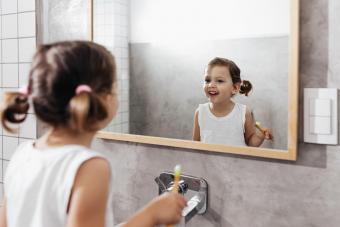
A good morning can set a precedent for the rest of the day. Frantically rushing out the door isn't fun for anyone, but a solid morning routine for kids can help make the day more positive. Ease the stress and start your family's the day off right by setting up a simple plan with your kids.
How to Create a Successful Morning Routine for Kids
Avoid a frenzied dash out the door and make your mornings simpler with these helpful tips. Remember, these steps are starting points - while there are some basic things that can work for most families, keep in mind what your kids specifically need and tailor your morning routine to what's best for your situation. There's no right or wrong when it comes to setting up a good morning routine as long as it works for your family.
Charts and Checklists Can Help Kids Stay on Task
Having children's morning routines laid out in charts or checklists can help them stay on top of their morning tasks and give them a bit of control throughout the start of their day. It not only helps them learn responsibility, it can help improve their confidence as they'll likely feel good about getting things done on their own.
A simple kids morning routine chart with with pictures works if you have younger children.
For older kids, a morning routine checklist that has a bit more detail will help them keep track of essential tasks to start the day.
Check the Forecast
What should your kids wear for school? What will the roads look like in the morning? Will your kids need an umbrella? Will the school cancel athletic practices due to snow? Do your kids need to wear sunscreen?
A first step to a solid morning routine can start with checking the weather. This an easy way to make sure that you have a clear picture of the day ahead and the hurdles that you may have to face. If rain's expected, you can plan to leave sooner. If there's snow in the forecast, then school could be delayed or canceled. If there's a big temperature drop, then your kids will need hats, gloves, and coats.
Parents can find an accurate outlook at Weather.gov. Simply type in your city and state and you can determine high and low temperatures, wind speeds, and if any inclement weather is in the forecast.
While you may have looked at the week's forecast on Sunday, it's important for parents to re-check this information every night. The weather can change and that can leave you unprepared. Make sure that you get the most accurate forecast confirming the expected conditions each evening.
Prepare the Night Before
Another key to a stress-free morning is try to complete time consuming to-do's before your kids head off to bed. This helps make sure that everyone has time to get ready in the morning and that things don't get forgotten as you hurry out the door. Your evening checklist might include:
- Picking out outfits
- Packing backpacks
- Preparing lunches
- Signing school notes
- Taking showers or baths
Also, remember that kids are notorious for bringing up things they need for school projects and fundraisers the morning they are required. Thus, talk to your kids each night and ask them recall questions to help jog their memories.
For example - Do you have any projects coming up? What supplies will you need for those? Do you have a school party for St. Patrick's Day? Are you required to bring anything? What do they need for their game on Friday? This can make everyone's lives easier and remove some of the stress that can arise early in the morning.
Any human being, no matter what their age, can fall behind or get sidetracked. This is especially true of parents who are juggling the care of multiple people. Take the time to lay out your clothes, put your coffee cup on the Keurig drip tray, and make sure that the car is all gassed up.
Foster Good Sleep
Did you know that "kids who regularly get an adequate amount of sleep have improved attention, behavior, learning, memory, and overall mental and physical health"? Getting a restful sleep has so many benefits and it can make your kid's morning routine much easier.
The American Academy of Pediatrics recommends specific sleep times for different age ranges, so adjust bedtimes based on your child's age.
| Ages (years) | Sleep Time Ranges |
| 1 - 2 | 11 - 14 hours* |
| 3 - 5 | 10 - 13 hours* |
| 6 - 12 | 9 - 12 hours |
| 13 - 18 | 8 - 12 hours |
*The advised times for children five and under include naps in the table above.
One thing for parents to think about is setting a solid bedtime every night and trying to stick to it. By doing this, even on weekends, you can help make sure that your child gets the rest required to conquer any activity in their day. While it can be enticing to let them stay up later on weekends, even small shifts can disrupt a child's circadian rhythm.
No matter how firm you are on bedtimes, however, you can use these tips to help your family get better sleep.
- Get active in the evening - This can include a family walk, playing basketball in the driveway, or getting a yoga session in before bed.
- Turn off electronic devices an hour before bedtime.
- Set a time to get ready for bed and a time to get into bed - A problem that often occurs at bedtime is that kids start getting on pajamas, brushing their teeth, and wanting their nightly story AT bedtime. This can shorten their sleep window, making them less prepared for the following day.
- Turn off lights throughout your home and try to make the house quiet at least 30 minutes before everyone should be in bed.
Set Padded Wake Up Times
If you need 45 minutes to get your child ready for the day, give yourself some cushion time. Consider waking everyone up an extra fifteen minutes early each morning. This gives your kids time to ease into the start of their day and gives you some wiggle room when problems pop up.
Building some extra time into your morning routine also allows you to actually talk to your kids and help them prepare for their day. For example, you can:
- Keep them confident with a daily affirmation.
- Offer to quiz them before their big test.
- Ask about what they're looking forward to the most in their day.
- Remind them about afternoon activities or changes in their usual evening schedule.
Eat a Healthy Breakfast
If you want your car to work, you put fuel in the tank. Make sure that you and your kids have a well-rounded meal to jump start their day and keep their minds focused on school, and not their stomachs.
How to you find the time to prepare a healthy breakfast? Parents have a few options. First, meal prep can ensure a fresh and healthy start and gives parents full control of the ingredients. However, not everyone has the time to conduct this weekly chore. If you fall into this category, then consider purchasing protein-packed items you can throw in the microwave or the toaster.
Great choices for busy parents who want their kids to stay healthy and full throughout the morning can include:
- Frozen frittatas
- Protein waffles or whole grain toast with peanut butter
- Yogurt or cottage cheese
- Fresh fruits like bananas, oranges, berries, and apples
- Whole grain cereal with low-fat milk
Get Ready With a Purpose
Did you know that making your bed each morning can make you more productive throughout the rest of the day? This simple task can have a big impact, so add this to your kid's morning routine chart.
Other things you might want to include on a morning routine checklist for kids to check off:
- Going potty when they first wake up
- Getting dressed
- Eating breakfast
- Doing their hair
- Brushing their teeth
- Prepping for the weather (putting on sunscreen, coats, rain gear, etc)
- Putting shoes on
- Grabbing backpacks, extracurricular supplies, and getting loaded into the car!
Tips for Making Kids Morning Routines Successful
For the parents who have multiple kids and work to juggle each morning, there are several key concepts that can help you stay on schedule and make your morning routines a success.
- Older kids, pre-teens, and teens should have an alarm. This puts some responsibility on them, lessening your load.
- Set alarms for yourself - not to wake up, but to keep you aware of the time. A fifteen-minute and five-minute warning can keep you from getting sidetracked. A final 'it is time to leave' alarm can also let everyone know they need to get in the car immediately.
- Remove distractions. The mornings are not for social media, electronics, or television. Keep everyone on task by staying unplugged.
- Finally, stay positive. Show appreciation for your kids staying on schedule and start your car ride with a positive thought!
Children Thrive on Routines
Research shows that "children with regular routines at home have self-regulation skills, the building blocks of good mental health." By setting a morning schedule that works for your family and giving kids some consistency and structure in their mornings, parents can help their kids thrive throughout their day and better handle challenges as they arise.







